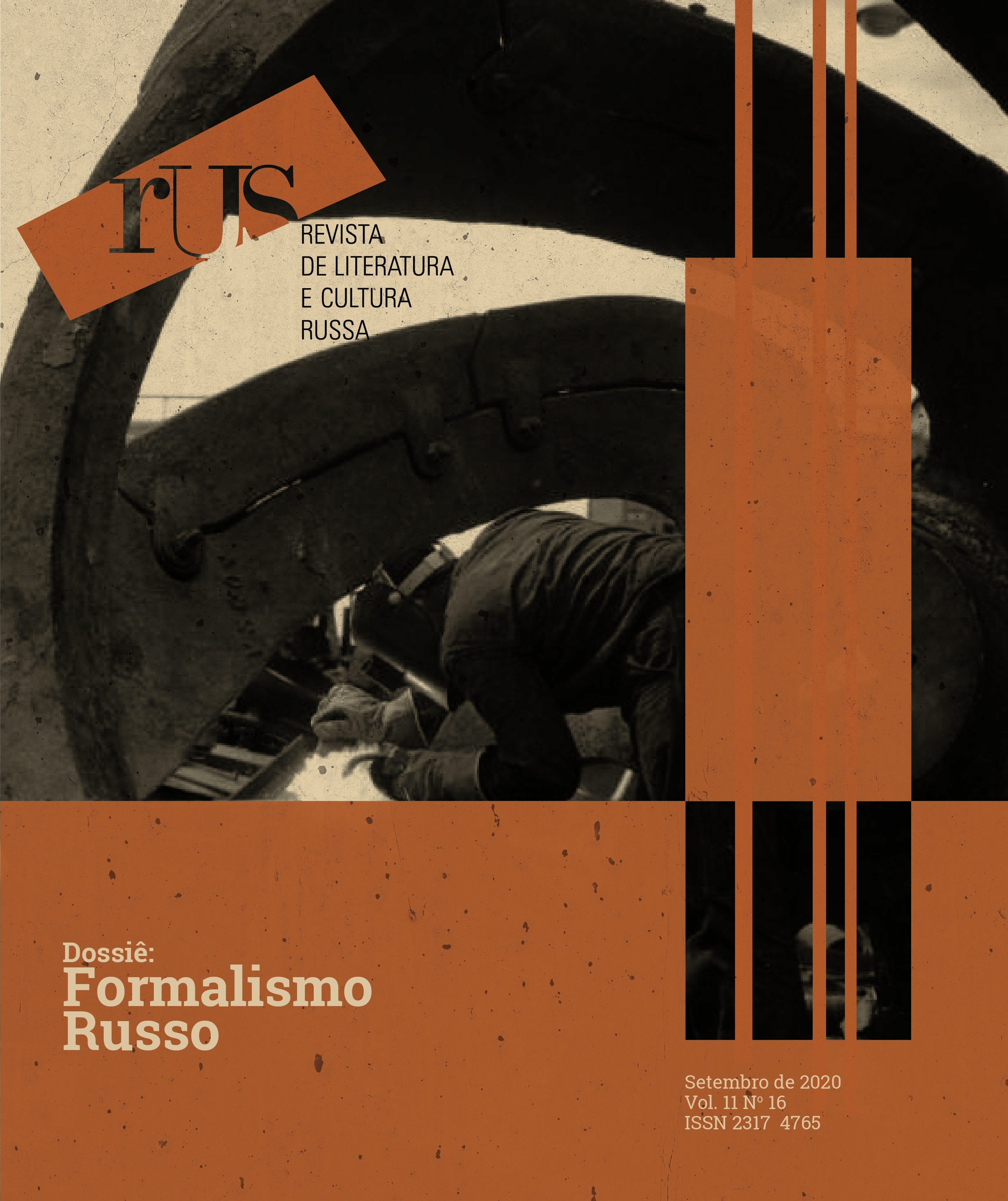Ostranenie: to give back the sensation of life
DOI:
https://doi.org/10.11606/issn.2317-4765.rus.2020.168820Keywords:
Shklovsky's Ostranenie, Comparative Literatura, Cognitive StudiesAbstract
The present article studies Shklovsky’s idea of emotional and cognitive renewal of the habitual – ostranenie – alongside cognate concepts in psychology and cognitive studies. It redefines ostranenie not as a device (as commonly accepted in literary studies), but as a cognitive/psychological effect, and suggests the term “extratextual ostranenie” to refer to the feeling one has when the usual becomes seemingly strange – and at the same time more rather than less emotionally relevant. As for literary ostranenie, even when it is created though characters who feel alienated or depersonalized, the readers’ experience is exactly the opposite experience – emotional reconnection to the world.
Downloads
References
ALEXANDROV, Vladimir. “Literature, Literariness, and the Brain.” Comparative Literature, vol. 59, no. 2 (Spring, 2007), pp. 97-118.
AMIS, Martin. Money. London: Penguin, 1985.
AMIS, Martin. Other People. New York: Vintage, 1994.
AURACHER, Jan. “... Wie Auf Den Allmächtigen Schlag Einer Magischen Rute”: Psychophysiologische Messungen Zur Textwirkung. Baden-Baden: Dt. Wissenschafts-Verlag, 2007.
BAMELIS, Lotte L M, Silvia M A A Evers, Philip Spinhoven, and Arnoud Arntz. “Results of a Multicenter Randomized Controlled Trial of the Clinical Effectiveness of Schema Therapy for Personality Disorders.” The American Journal of Psychiatry, vol. 171 (3), American Psychiatric Association, 2014, pp. 305–322.
BECK, Aaron T. Cognitive Therapy and the Emotional Disorders. Madison: International Universities Press, 1975.
BERLINA, Alexandra. Viktor Shklovsky: A Reader. New York: Bloomsbury. 2015, ed. 2016.
BERLINA, Alexandra. “Translating ‘Art, as Device.’” Poetics Today, vol. 36 (3), 2015, pp. 151–56.
BERLINA, Alexandra. “Religion and War Made Strange: Ostranenie in Vonnegut’s Slaughterhouse-Five.” Amerikastudien / American Studies, vol. 62 (1): forthcoming, 2017.
BOHRN, Isabel et al. “Old Proverbs in New Skins: An FMRI Study on Defamiliarization.” Frontiers in Psychology, vol. 3, 2012, 204 pp.
COLMAN, Andrew M. Oxford Dictionary of Psychology. Oxford: Oxford University Press, 2008.
COMENIUS, Johann Amos. The Labyrinth of the World and the Paradise of the Heart. Translated by Howard Louthan and Andrea Sterk. Costa Mesa: Paulist Press, 1998.
COOK, Guy. Discourse and Literature: The Interplay of Form and Mind. Oxford University Press, 1994.
DASTON, Lorraine J.; PARK, Katharine. Wonders and the Order of Nature, 1150-1750. New York: Zone Books, 2001.
DEFOE, Daniel. Robinson Crusoe. London: Penguin, 2003.
DEK, Eliane et al. “Perseveration Causes Automatization of Checking Behavior in Obsessive-Compulsive Disorder.” Behaviour Research and Therapy, vol. 71, 2015, pp. 1–9.
DUHIGG, Charles. The Power of Habit: Why We Do What We Do in Life and Business. New York: Random House, 2012.
FAUCONNIER, Gilles; TURNER, Mark. The Way We Think: Conceptual Blending and the Mind’s Hidden Complexities. New York: Basic Books, 2008.
GINZBURG, Carlo. 1996. “Making Things Strange: The Prehistory of a Literary Device.” Representations, no. 56, pp. 8–28.
GÜNTHER, Hans. “Verfremdung: Brecht Und Šklovskij.” In: Gedächtnis Und Phantasma. Festschrift Für Renate Lachmann., edited by Susi K. Frank, Erika Greber, Schamma Schahadat, and Igor Smirnov. München: Kubon & Sagner, 2001, pp. 137–45.
HAKEMULDER, Jemeljan F. “Foregrounding and Its Effect on Readers’ Perception.” Discourse Processes, v. 38 (2). Lawrence Erlbaum Associates, Inc., 2010, pp. 193–218.
HANAUER, David. “The Genre-Specific Hypothesis of Reading: Reading Poetry and Encyclopedic Items.” Poetics, vol. 26 (2), 1998, pp. 63–80.
HANSEN-LÖVE, Aage A. Der russische Formalismus. Wien: Verlag der Österreichischen Akademie der Wissenschaften, 1978.
HUNT, Russell, and Douglas VIPOND. “Hunt, Russell/Douglas Vipond, Crash-Testing a Transactional Model of Literary Reading.” Reader: Essays in Reader-Oriented Theory, Criticism, and Pedagogy, vol. 14, 1985, pp. 23–39.
HUXLEY, Aldous. Point Counter Point. London: Random House, 2009.
KAREEM, Sarah Tindal. Eighteenth-Century Fiction and the Reinvention of Wonder. Oxford: Oxford University Press, 2014.
KIDD, David C.; CASTANO, Emanuele. “Reading Literary Fiction Improves Theory of Mind.” Science (New York, N.Y.) vol. 342 (6156), 2013, pp. 377–80.
KOESTLER, Arthur. The Act of Creation. Arkana, 1964.
KOOPMAN, Eva M.; HAKEMULDER, Frank. “Effects of Literature on Empathy and Self-Reflection: A Theoretical-Empirical Framework.” Journal of Literary Theory, vol. 9 (1), 2015, 79–111.
KUMAGAI, Arno, WEAR, Delese. “‘Making Strange’: A Role for the Humanities in Medical Education.” Academic Medicine, vol. 89 (7), 2014, pp. 973–977.
KUYKEN, Willem et al. “Effectiveness and Cost-Effectiveness of Mindfulness-Based Cognitive Therapy Compared with Maintenance Antidepressant Treatment in the Prevention of Depressive Relapse or Recurrence (PREVENT): A Randomised Controlled Trial.” The Lancet, vol. 386 (9988), 2015, pp. 63–73.
LANGER, Ellen. Mindfulness. Boston: Da Capo Press, 1989.
LAZAR, Rina. “The Familiar and the Strange: The Dynamics of Change.” The Israel Journal of Psychiatry and Related Sciences, vol. 32 (3), 1995, pp. 157–166.
MIALL, David S.; KUIKEN, Don. “Foregrounding, Defamiliarization, and Affect: Response to Literary Stories.” Poetics, vol. 22 (5), 1994, pp. 389–407.
MITCHELL, Stanley. “From Shklovsky to Brecht: Some Preliminary Remarks Toward a History of Politization of Russian Formalism.” Screen, vol. 15, 1974, pp. 74–80.
OATLEY, Keith. “A Taxonomy of the Emotions of Literary Response and a Theory of Identification in Fictional Narrative.” Poetics vol. 23 (1–2), 1995, pp. 53–74.
PEER, Willie van. Stylistics and Psychology: Investigations of Foregrounding. London: Croom Helm, 1986.
ROBINSON, Douglas. Estrangement and the Somatics of Literature: Tolstoy, Shklovsky, Brecht. Baltimore: John Hopkins University Press, 2008.
SEMINO, E. 1995. “Schema Theory and the Analysis of Text Worlds in Poetry.” Language and Literature, vol. 4 (2), pp. 79–108.
SHELLEY, Percy Bysshe. The Selected Poetry and Prose of Shelley. Wordsworth Editions, 1994.
SHKLOVSKY, Viktor. “Art as Technique.” In: Russian Formalist Criticism: Four Essays, translated by Lee T. Lemon and Marion J. Reis. Lincoln: University of Nebraska Press, 1965, pp. 3–24.
SHKLOVSKY, Viktor. “Art as Device.” Book Section. In: Theory of Prose, translated by Benjamin Sher. Champaign: Dalkey Archive Press, 1991, pp. 1–14.
SHKLOVSKY, Viktor. “A Sentimental Journey.” In: Viktor Shklovsky: A Reader, translated by Alexandra Berlina. New York: Bloomsbury Academic, 2016a, pp. 135–152.
SHKLOVSKY, Viktor. “‘Art as Device.’” In: Viktor Shklovsky: A Reader, translated by Alexandra Berlina. New York: Bloomsbury Academic, 2016b, pp. 73–96.
SHKLOVSKY, Viktor. “On the Theory of Prose (1983).” In: Viktor Shklovsky: A Reader, edited by Alexandra Berlina. New York: Bloomsbury Academic, 2016c, pp. 298–344.
SHKLOVSKY, Viktor. “Tales about Prose.” In: Viktor Shklovsky: A Reader, edited by Alexandra Berlina. New York: Bloomsbury Academic, 2016d, pp. 258–274.
SPIEGEL, Simon. “Things Made Strange: On the Concept of ‘Estrangement’ in Science Fiction Theory.” Science Fiction Studies, vol. 35 (3), 2008, pp. 369–85.
STEINER, Genevieve Z, and Robert J Barry. “The Mechanism of Dishabituation.” Frontiers in Integrative Neuroscience, vol. 8, 2014, 14pp.
STERNBERG, Meir. “Epilogue. How (Not) to Advance toward the Narrative Mind.” In: Cognitive Poetics: Goals, Gains and Gaps., edited by Geert Brône and Jeroen Vandaele, 2009, pp. 455–532.
STERNBERG, Robert. Cognitive Psychology. Boston: Cengage Learning, 2008.
STORBECK, Justin; CLORE, Gerald. “On the Interdependence of Cognition and Emotion.” Cognition & Emotion, vol. 21 (6), 2007, pp. 1212–1237.
STRIEDTER, Jurij. Texte Der Russischen Formalisten I. München: Wilhelm-Finck-Verlag, 1969.
SUVIN, Darko. Metamorphoses of Science Fiction: On the Poetics and History of a Literary Genre. Yale University Press, 1979.
TODOROV, Tzvetan. “Poetic Language: The Russian Formalists.” In: Literature and Its Theoretists, edited by Tsvetan Todorov. London: Routledge, 1988, pp. 10–28.
TOLSTOY, Lev. War and Peace. Translated by Louise and Aylmer Maude. 2016. Project Gutenberg. Available at: https://www.gutenberg.org/files/2600/2600-h/2600-h.htm.
VAILE WRIGHT, Caroline; COLLINSWORTH, Linda; FITZGERALD, Louise. “Why Did This Happen to Me? Cognitive Schema Disruption and Posttraumatic Stress Disorder in Victims of Sexual Trauma.” Journal of Interpersonal Violence, vol. 25 (10), 2010, pp. 1801–1814.
VARRA, Edward M. et al. “Factor Analysis of the Trauma and Attachment Belief Scale: A Measure of Cognitive Schema Disruption Related to Traumatic Stress.” Journal of Psychological Trauma, vol. 7 (3). Taylor & Francis Group, 2008, pp. 185–196.
VONNEGUT, Kurt. Slaughterhouse-Five or The Children’s Crusade: A Duty-Dance with Death. New York: Dell Publishing, 1991.
VONNEGUT, Kurt. Breakfast of Champions. Manhattan: Random House, 2010.
YOUNG, Jeffrey. Cognitive Therapy for Personality Disorders: A Schmema-Focused Approach. Sarasota: Professional Resource Press, 1994.
YOUNG, Jeffrey, Janet Klosko, and Marjorie Weishaar. Schema Therapy: A Practitioner’s Guide. New York: Guilford Press, 2006.
ZHANG, Ting, et al. “A ‘Present’ for the Future: The Unexpected Value of Rediscovery.” Psychological Science, vol. 25 (10), 2014, pp. 1851–60.
ZUNSHINE, Lisa. Why We Read Fiction: Theory of Mind and the Novel. Columbus: Ohio State University Press, 2006.
Downloads
Published
Issue
Section
License
Copyright (c) 2020 Alexandra Berlinda

This work is licensed under a Creative Commons Attribution-NonCommercial-ShareAlike 4.0 International License.
Authors who publish in RUS agree to the following terms:
a. Authors retain copyright and grant the journal right of first publication with the work simultaneously licensed under a Creative Commons Attribution 4.0 International License (CC BY-NC-SA 4.0) that allows others to share the work with an acknowledgement of the work’s authorship and initial publication in this journal.
b. Authors are able to enter into separate, additional contractual arrangements for the non-exclusive distribution of the journal’s published version of the work (e.g., post it to an institutional repository or publish it in a book), with an acknowledgement of its initial publication in this journal.
c. Authors are permitted and encouraged to post their work online (e.g., in institutional repositories or on their website) prior to and during the submission process, as it can lead to productive exchanges, as well as earlier and greater citation of published work (See The Effect of Open Access).





